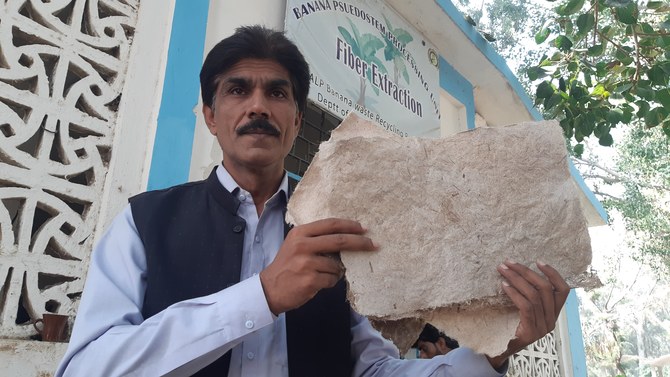HYDERABAD, Sindh: Scientists in Pakistan's Sindh have started extracting fiber from banana waste in what textile industry stakeholders and farmers hope could become an alternative to cotton.
Banana fiber is one of the strongest natural fibers. Biodegradable and similar to bamboo fiber, it is made from the stem of the banana tree, which is mainly composed of cellulose.

A laborer prepares to cut a bunch of bananas at the MH Panhwar Fruit Farms at Tandojam, Pakistan, on November 5, 2021. (AN photo by Zulfiqar Kunbhar)
Sindh province is Pakistan's main producer of bananas, contributing 80% of its yield — and tens of thousands of tons of waste as banana plants only give fruit once in their lifespan and the rest of the tree is discarded after harvest.
Research on converting banana waste into biodegradable materials has been ongoing for a few years in countries such as Australia and Japan, but in Pakistan the project spearheaded by the Sindh Agriculture University Tandojam (SAUT) is a first.

A laborer displays banana waste ready to be turned into the fiber at Sindh Agriculture University, Tandojam, Pakistan, on November 5, 2021. (AN photo by Zulfiqar Kunbhar)
"At SAUT we have recently started a pilot project to make valuable products out of banana waste. From banana waste we are producing products, including banana fiber and solid and liquid compost," Prof. Dr. Inayatullah Rajpar, who heads the department of soil science at SAUT, told Arab News earlier this week.
The recycling of waste will also help reduce pollution from banana farms.

A laborer cuts material from banana waste at Sindh Agriculture University, Tandojam, Pakistan, on November 5, 2021. (AN photo by Zulfiqar Kunbhar)
"Sindh produces 35,000 tons of banana wastage every year which is either burnt or thrown away, contributing to environmental degradation," he said. "This initiative will help farmers renounce the environment unfriendly practices and make money out of fruit waste."
When farmers lop off bananas from the trees, they generally leave the bulky, bulbous trunks to decompose and waste away. But under the SAUT project, strips of banana tree sheath are boiled in an alkaline solution to soften and separate them in order to produce fiber. Once separated, the fibers are joined together to create long threads, which later can be dyed or weaved.

A laborer makes fiber from banana waste at Sindh Agriculture University, Tandojam, Pakistan, on November 5, 2021. (AN photo by Zulfiqar Kunbhar)
As fabrics made from banana fibers can be soft and substitute cotton, the country's textile industry and farmers see potential in their production, and a chance to help the country reduce its import bill.
Most of Pakistan's cotton has been imported in recent years as production decreased. In 2019-20, Pakistan's cotton harvest was the lowest in over three decades, and in 2020-21 the yield was down by nearly 30%.

A view of the fiber-making process from banana waste at Sindh Agriculture University, Tandojam, Pakistan, on November 5, 2021. (AN photo by Zulfiqar Kunbhar)
“Pakistan’s national annual cotton yield has come to half in the last decade or so during the last decade due to climate change and other factors," Hyderabad-based agriculturist Ghulam Sarwar Panhwar told Arab News.
As banana is a higher return crop than cotton, using its waste for fiber production would make cultivation even more profitable for all stakeholders.

A laborer pours liquid fertilizer obtained from banana waste at Sindh Agriculture University, Tandojam, Pakistan, on November 5, 2021. (AN photo by Zulfiqar Kunbhar)
“For instance, one acre can produce Rs150,000 ($840) worth of cotton. In contrast, one acre can produce Rs200,000 to Rs300,000 worth bananas. Benefit from banana fiber would be additional for growers," Panhwar said.
Mustafa Bari, director of Bari Textile Mills Pvt, said while more research was required to estimate the potential of banana fiber in replacing cotton yarn, the project was promising as it would help the local textile industry meet international demand for sustainable, value-added produce on markets such as the EU.

Farmers burn banana waste at a farm in Tandojam, Pakistan, on November 5, 2021. (AN photo by Zulfiqar Kunbhar)
"Replacing of cotton yarn with banana yarn would add value to it," he said. "Also, there are multiple potentials of banana waste like paper, fertilizer, etc."
















